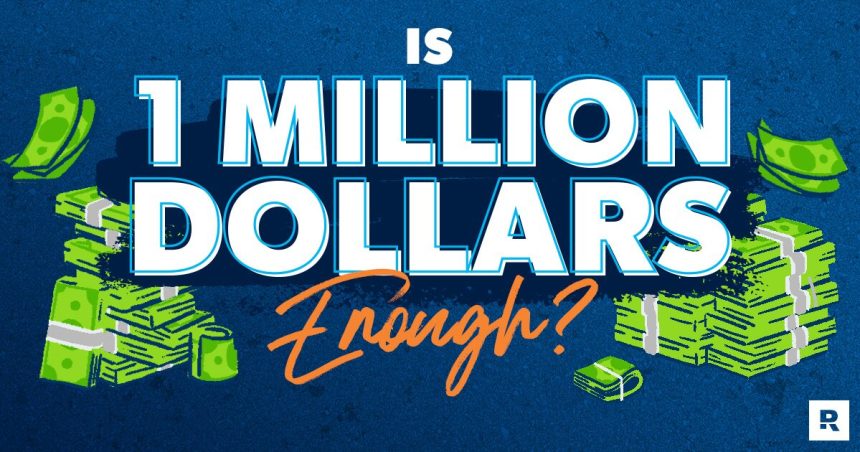Did you know that if you had $1 million in dollar bills, it would literally weigh a ton and take you about 12 days to count it all? No matter how you slice it, that’s a lot of money!
For a long time, a $1 million nest egg was the measure of retirement planning success. It was considered enough to enjoy a dream retirement and leave an impressive legacy behind.
But lately, the image of the $1 million nest egg has started to fade. Articles like “How to Get By on $1 Million in Retirement” have been popping up all over the place, filled with advice about tapping your home equity or retiring overseas to make your savings last.
So is an actual ton of cash still enough to get you comfortably through your golden years? Let’s find out!
Is $1 Million Really Enough to Retire On?
Do you remember that old fable about the goose that laid the golden eggs? Think of all your retirement accounts as your goose, and the growth your investments produce each year inside those accounts (aka the money your money makes) as the golden eggs you plan to live off of in retirement.
The idea is this: You want to have enough money in your retirement account so that you can live off the growth of your investments each year (the golden eggs) without touching the base of your retirement savings (the goose).
Let’s imagine you have $1 million in your retirement accounts by the time you retire. Historically, the stock market has an average annual rate of return between 10–12%.1 So if your $1 million is invested in good growth stock mutual funds, that means you could potentially live off of $100,000 to $120,000 each year without ever touching your one-million-dollar goose.
But let’s be even more conservative. Even if your account produces average returns somewhere in the ballpark of 7% each year—that’s still $70,000 worth of income to work with. (Keep in mind that the average household income in America today is around $69,700 per year.)2
The million-dollar question now becomes: Can you live off somewhere between $70,000 and $120,000 each year in retirement? That’s a question only you can answer!
Of course, keep in mind that 10–12% is an average. Some years your money will grow even more than that. Other years you might see smaller returns or even negative returns. If you’re not careful and you stop paying attention to how your investments are performing, you could wind up burning through your nest egg faster than you think and end up relying on Social Security (or Social Insecurity, is more like it).
That’s why you need to keep working with a financial advisor in retirement—someone who can help you manage your investments and make sure you don’t accidentally shoot your goose!
Figuring Out How Much Is Really Enough for Retirement
With careful planning and a solid investing plan, it is absolutely possible to retire with dignity on $1 million today (no matter what some blogger writing from their mother’s basement might try to tell you)!
But what if you’re retiring 10 years from now? Or 20 years from now? Will $1 million still be enough to have a comfortable retirement then? It’s definitely possible, but there are several factors to consider—including cost of living, the taxes you’ll owe on your withdrawals, and how you want to live in retirement—when thinking about how much money you’ll need to retire in the future.
1. Cost of Living
Whether you’re shopping for a gallon of milk from the grocery store or looking for the latest tech gadget, one thing is true: The cost of goods goes up over time. That’s just a fact of life!
How much will you need for retirement? Find out with this free tool!
Just look at the price of gas. At the beginning of 2001, you could have filled up your tank at around $1.47 per gallon. Fast forward to Summer, 2023 and the average price for a gallon of gas ballooned to $3.86!3 Thanks a lot, inflation . . .
Yep, the inflation rate has been a lot higher than normal recently, but the average rate is around 3%. Assuming things get back to normal sometime soon, $1 million today will have the same purchasing power as $1.8 million two decades from now.4 That means if you plan to retire in 20 years, you might need an extra $800,000 in your nest egg to live the kind of lifestyle $1 million would buy you in retirement now.
That’s why you should invest 15% of your gross income into good growth stock mutual funds. Work with an investment professional who can help you find funds that have a long track record of solid returns, which will help your money grow faster than inflation!
Ramsey Solutions is a paid, non-client promoter of participating pros.
2. Taxes
Even in retirement, Uncle Sam still takes his share, and income taxes can really trip you up, especially if all your retirement savings are in tax-deferred accounts like a traditional 401(k) or traditional IRA. The money you take out from those accounts in retirement will get hit with income taxes—just like the income you earned from your job.
That means you might need to withdraw a few thousand dollars extra from your savings each year to pay your taxes and maintain the kind of lifestyle you want in retirement. And because you’re withdrawing more, you’ll need to have more saved to avoid running out of money during retirement.
But if you’re saving for retirement with a Roth IRA or a Roth 401(k), that’s a whole different story. With Roth accounts, your contributions are made with after-tax dollars. That means in most cases, once you turn 59 1/2 you won’t owe income taxes on any or most of the money you withdraw from those accounts. Woo-hoo!
So if you’re deciding between a Roth or traditional retirement account, here’s the bottom line: Roth beats traditional every time!
Keep in mind that you also might need to pay taxes on your Social Security benefits depending on your situation. That’s why it’s always a good idea to consult a tax pro to make sure your tax bases are covered.
3. Lifestyle in Retirement
Cost of living and taxes will help you figure out how much money you’ll need in your golden years. But there’s one more factor—and it’s the most important one: You!
How you want to live in retirement will determine how big your nest egg needs to be. A person who wants to travel the world in retirement, for example, will need a lot more in the bank than a person who wants to volunteer in their community and watch their grandkids grow up.
And remember to keep a proper perspective about what a millionaire lifestyle actually looks like. A lot of folks think millionaires fly around in private jets and dine out on lobster and filet mignon every night, but that’s just not true!
According to The National Study of Millionaires, the vast majority of millionaires live on less than they make, spend $200 or less each month at restaurants, and still use coupons to look for good deals. Even though they don’t really have to worry about money anymore, they’re still careful about spending in retirement—and you should be too!
This article provides general guidelines about investing topics. Your situation may be unique. If you have questions, connect with a SmartVestor Pro. Ramsey Solutions is a paid, non-client promoter of participating Pros.
Read the full article here
















